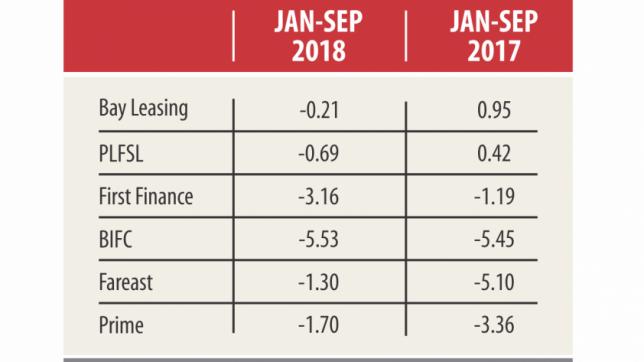Earnings of listed NBFIs sink

Almost 64 percent of the listed non-bank financial institutions (NBFI) witnessed huge drops in their earnings in the first nine months of the year due to interest rate cutbacks, huge provisioning against default loans and losses from capital market.
Some 14 of the 22 NBFIs saw their earnings per share (EPS) plummet between the months of January and September.
The heavyweight Investment Corporation of Bangladesh is yet to report its earnings for the quarter.
EPS informs how much money shareholders would receive for each share of stock they own if the company distributes all of its net income for the period.
BD Finance, FAS Finance, GSP Finance, IDLC, Islamic Finance, LankaBangla, Midas, National Housing, Phoenix and Premier Leasing saw their EPS decline during the quarter, according to data from the Dhaka Stock Exchange.
Peoples Leasing and Bay Leasing incurred losses, contrary to being in the black a year earlier. First Finance and BIFC fell more in losses in this quarter.
There was a liquidity crunch in the first half of the year, so banks and NBFIs faced problems in achieving a good loan growth, according to Arif Khan, managing director of IDLC Finance.
“This impacted the profits,” he added.
According to the central bank data, the
credit growth stood at 14.67 percent in September, the lowest since December 2015, when the growth was 14.19 percent. Most of the NBFIs have exposure in the capital market, so the index's downward trend affected their profitability, according to Khan. DSEX, the prime index of the DSE, declined 886 points, or 16.50 percent, in the first nine months of the year, according to data from the DSE. In contrast, a year earlier the index soared 1,009 points or 19.85 percent.
“Bad management and bad governance also caused the decline in profit,” Khan added.
The financial sector is suffering from huge bad loans, so they have to keep provisioning that is eating into the profits, said Khondkar Ibrahim Khaled, a former deputy governor of the Bangladesh Bank.
The sector also has to maintain lower interest rates (6 percent on deposits and 9 percent on lending), which is putting pressure on the profits, said Khaled, also a former chairman of Bangladesh Krishi Bank. Both public and private banks decided on July 1 to lower the lending rate to single digit and the deposit rate to 6 percent.
LankaBangla Finance had to keep huge amounts in the provisioning account, which pushed the EPS to down, said Khwaja Shahriar, its managing director.
Their income from the stock market also declined due to the sinking index. “If the stock market bounces back, so will our EPS,” Shahriar said.
